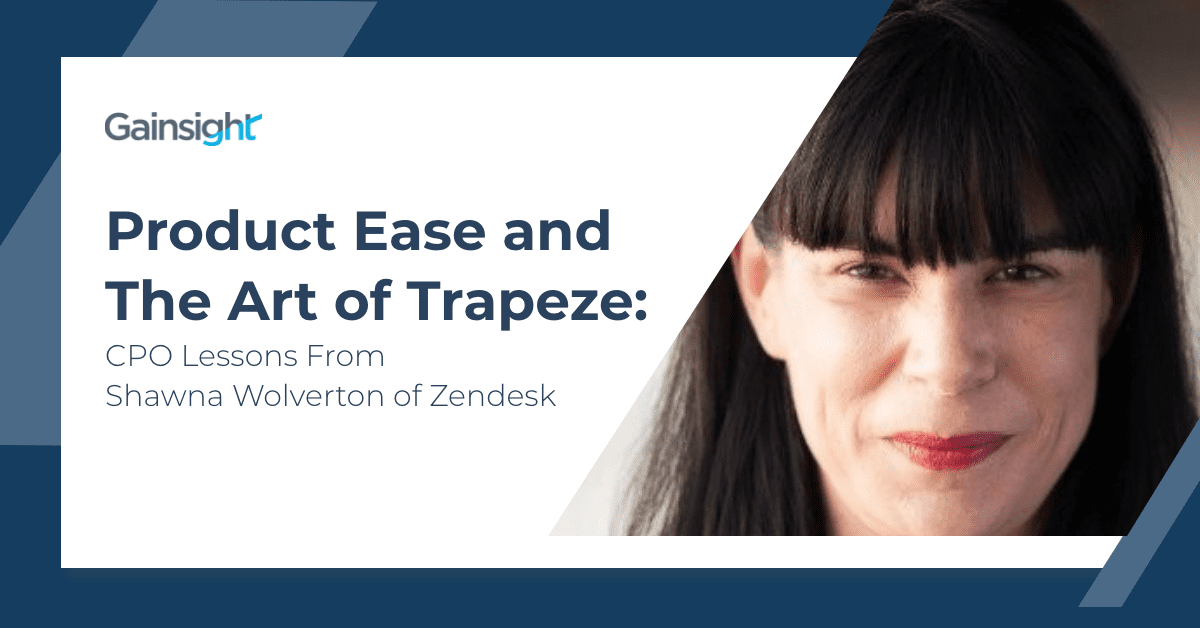When Nick Mehta, CEO of Gainsight, interviews company leaders, he often asks them about their favorite games or hobbies. Some play poker or proudly announce their skill in Monopoly. However, when Nick chatted with Shawna Wolverton, EVP of Product of Zendesk, she declared her hobby as the static trapeze. Shawna is one of the many insightful CPOs we have hosted during our Path to Becoming a CPO series. Watch the replay of Shawna’s conversation here or register for the rest of the series here.
The static trapeze, sometimes called the fixed trapeze, is a bar of about two feet wide, one and a half inches in diameter, and is hung on ropes as long as 12 feet. The singer Pink has incorporated it into her show, and Cirque du Soleil has used static trapeze acts for years. It is not an easy art form. Sometimes you find yourself suspended in the air, hanging upside down, secured by a knee or a foot. It takes control, incredible strength, and, most important, trust in oneself and others’ abilities. When done right, it is a sight to behold—movements of grace combined with power.
If there ever were an analogy of the effect of Product on a customer or a business, it would be static trapeze. There is a fixed constant, the product, while the artist can change position and form on or around it, like features and functions. It can be flexible and robust, like the artist. But it is only successful if the product is strong and the user is educated and proficient.
The Ups and Downs of a Career Journey
There is no standardized path to the CPO chair. Shawna’s journey to the C-suite had been as unique as her hobby. She has a degree from UC Santa Cruz in political science and Russian studies. Through a contact at Autodesk, she joined a localization team on a short-term project.
Localization is a very detailed art of adapting software and interfaces for specific regions, locales, cultures, and languages allowing users to better connect to your product. Shawna possessed the nuance of understanding localization, but she also learned desktop publishing, file editing, and gained significant software engineering exposure. Shawna stated, “I was immediately hooked from there.”
Shawna went from project to project, creating websites, and working for startups. Eventually, she became a project manager, but unfortunately, it was at that time in the early to mid-2000s when an economic downturn occurred. That is when a friend called her and informed her of a localization position at Salesforce. “Salesforce seemed like a good place,” Shawna said. “And so I took the lead, which turned out to be a very good decision.”
Both Nick and Shawna expressed that in careers, you sometimes step back to step forward. The right company, the right role, or position doesn’t always present itself. Often it may take patience to wait for the opportunity to transition into a better role. In hindsight, Shawna made a fantastic decision and just did the job at hand. That is when Shawna noticed that no one was taking care of international product issues.
“They [international product issues] weren’t owned. It was a quirk in the ticket routing system where all kinds of product issues got routed to me. Maybe because I was young, I was too afraid to tell someone that it wasn’t my job. So, I began running the build under my desk. I went through the code, repro the issue, and usually found a fix.” Shawna kept doing this for several years while reminding people it was a job she would officially like to do. Finally, they gave her a team.
Biases and Advice
There are misconceptions about most product roles. Nick asked Shawna what one misconception or bias surrounding product management roles was. Shawna explained it is the belief that PMs have “massive subject matter expertise or deep technical knowledge.”
“One of my favorite things about PMs and PM teams is that PMs come from so many different disciplines. The only sort of skill I think that you can’t live without is people. You have to love people because fundamentally, it’s not a technology job. It is a job of connecting with customers, connecting stakeholders in the business, connecting with your team members, and connecting with engineers. It’s a people job. And that’s the part that people sometimes miss.”
Nick agreed that people think that product management is mostly a technical job, but it truly is a “people” job. This notion resonates in Gainsight today. You will find individuals who are adept enough to have technical and domain expertise. However, that is something that can be learned. An understanding of people, while being “human-first” and how it affects your product, which is more important.
Another characteristic that Nick mentioned is perseverance. The willingness to volunteer and do work not always your own is a common theme among CPOs. Being at the right company, though not always in the right place, doors can still open with a show of genuine curiosity and persistence. Shawna shared the first piece of advice she gives most people when trying to find a path to get the job they want—in any career. “In almost any company, there is more work that needs doing than there are humans to do it. And if it’s lying around on the floor, pick it up.”
Shawna is right. Many of the CPOs featured in this series did part of their future job just by volunteering. It is a form of self-advocacy and applying for the job through the proof of your work. Nick commented that he found it interesting Shawna didn’t just do the job she had. She took it to the last mile, even reproducing the problem. “I’ve seen a lot of product managers get into product management by doing the job and then officially getting the role right,” he said. “That’s how hard it is to do the job.”
A Human Connection Super Power
Shawna’s ability to connect with people and understand human-first needs placed her on the path to a VP position on a global platform team at Salesforce. Shawna calls her human understanding a “superpower.” She explained it is a developed skill that served her well over the years. In short, it is transforming people’s perspective on the effect of the work they do and the product they produce. “It’s sort of making people who are a part of Product or what they’re doing feel excited about what they’re doing, though it may not be the hot, cool, bright, shiny thing. I got that globalization team believing they were saving the free world. And it was because I was able to connect how the things we did impact customers. For those people, they felt invested in it.”
In realizing her “superpower,” Shawna brought together a diverse group of PMs, or what she calls her “Island of Lost Toys.” The team members were not the “shiny things” core schema but were all performing an art form that few people could or wanted to do. This action of being attracted to the non-mainstream and diversity mirrored her journey of starting at the bottom of the platform and working her way up. Shawna eventually took over the motions that were not necessarily what the company was known for.
Her group at Salesforce.com became responsible for page layout, editing, workflow and workflow builders, and the custom fields. It was all “the great stuff, the day to day stuff” that people used to customize and extend sales and service products. It may not have been the “bright and shiny,” but they were essential, necessary, and collectively significant. Shawna admitted to “flexing” unknown muscles to accomplish actions never practiced, such as Executive Briefing Centers (EBCs). But in doing “the fake it until you can make it” practice, as Nick calls it, she found a new strength that enhanced her career journey.
On to Bigger Things
Shawna did one last team transformation at Salesforce with Lightning, a component-based framework for app development. It simplifies the processes for business users, who typically do not have programming experience. Shawna described the experience as “Herculean,” especially compared to her next position, which was literally out this world.
Planet was a small start-up looking for someone to help build a platform for data that came from space. Their main focus was making satellites in a “little lab coat to the factory” workplace in San Francisco. Shawna was “floored” by the opportunity to create a product-market fit and figure out the possibilities with “cool space data.”
Despite the exciting experience not found in other places, Shawna realized that she missed CRM. “It turned out I am an enterprise software nerd,” she admitted. “Literal rocket launches could not keep me away. I’m a little ashamed, but it is a fact about me that I want to make things for customers and to watch them get value for themselves and their businesses. It’s the fire that burns in my gut.”
In leaving Planet, Shawna took with her the experimentation and experience of leading a team that helped her go to an admired company known for product management—Zendesk. Zendesk is a service-first CRM software company that helps businesses focus on support, sales, and customer engagement to enhance customer experience and relationships. With over 150,000 customers across a broad spectrum of industries, Zendesk tries to reach companies of every size, in 30 languages, globally. All of her past knowledge from years of experience in localization, team leadership, and human connection has found a home in global services and the C-suite at Zendesk.
Be Curious
Shawna believes the vital part of her journey is now helping this international company connect within themselves. She hoped to traverse silos by visiting each office and finding what was working and what was not. Now, her direction is in process and tools. While she may not be a part of building “cool stuff,” she finds excitement in building great teams and the framework to make their jobs possible. She also realizes that employers are hiring people with more PM experience in today’s challenging market than taking a chance on a person with an innate curiosity. Shawna wants to encourage people looking for PM roles to investigate companies with an associate product manager role. She believes it is an excellent way to get in and discover a sense of that job.
No matter where you find yourself, Shawna reminds those who want a way in and a path up to “Start picking things up, start doing things and become invaluable. And then it leads to a great job later. There is always a stepping stone to get you there.” Like her hobby, there is a sense of flexibility and fearlessness to Shawna. She is always willing to look to the next place but also looking to transform teams. As much as it seems that Shawna would rather be high in the air, the truth is she would not have accomplished all she has for herself, her teams, Product, and ultimately the customer if she wasn’t incredibly grounded.


